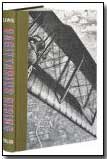Prose & Poetry - Cecil Lewis
 Cecil Arthur Lewis (1898-1997), a
successful British fighter pilot during the First World War at a time when
the average service life of a pilot was three weeks, enjoyed a successful and extraordinarily
diverse career which spanned numerous
disciplines.
Cecil Arthur Lewis (1898-1997), a
successful British fighter pilot during the First World War at a time when
the average service life of a pilot was three weeks, enjoyed a successful and extraordinarily
diverse career which spanned numerous
disciplines.
Having joined the Royal Flying Corps in 1915 at the age of 17 by lying about his age ("a stringy beanpole of a boy" he later wrote), Lewis was judged able to fly an aircraft solo following just eighty minutes of in-air instruction.
Lewis qualified as an air 'ace' by downing eight aircraft during May and June of 1917, flying the S.E.5a aircraft with 56 Squadron. During the earlier Battle of the Somme, in 1916, Lewis had earned the Military Cross for numerous actions performed during that offensive.
In writing his memoirs of the air war in 1936, Sagittarius Rising, Lewis created one of the classics of First World War literature (generally considered the finest air memoir of the war), a book still in print in Britain today.
Praised by George Bernard Shaw ("This prince of pilots had a charmed life in every sense of the word; he is a thinker, a master of words, and a bit of a poet"), Time magazine also wrote that the book "gracefully captured the exhilaration of aerial combat". This was followed by a number of sequels documenting his later life, including Sagittarius Surviving, All My Yesterdays, Farewell to Wings and Gemini to Joburg.
 However
Lewis's war experiences were merely the prelude to a widely varied career,
during which he operated as a commercial aviator (immediately following the
war, with Vickers), flying instructor (in Peking), as a playwright, Hollywood writer, co-founder of the BBC (an
experience he likened to "riding a tiger of a big adventure"), translator,
broadcaster, sheep farmer (in South Africa), civil servant (for the U.N.) and journalist.
However
Lewis's war experiences were merely the prelude to a widely varied career,
during which he operated as a commercial aviator (immediately following the
war, with Vickers), flying instructor (in Peking), as a playwright, Hollywood writer, co-founder of the BBC (an
experience he likened to "riding a tiger of a big adventure"), translator,
broadcaster, sheep farmer (in South Africa), civil servant (for the U.N.) and journalist.
Lewis was awarded an Academy Award, along with George Bernard Shaw, Ian Dalrymple and W. P. Lipscomb, at the 1938 Oscars ceremony for their screen adaptation of Shaw's Pygmalion.
During the Second World War Lewis again served with the Royal Air Force, initially as a flying instructor and, by the close of the war, responsible for staging posts in Sicily and Greece.
Finally (semi) retiring to Corfu in later life, Lewis continued to work to the end, this time as a poet. Cecil Lewis died in London on 27 January 1997 at the age of 98.
Prevalent dysentery among Allied soldiers in Gallipoli came to be referred to as "the Gallipoli gallop".
- Did you know?
